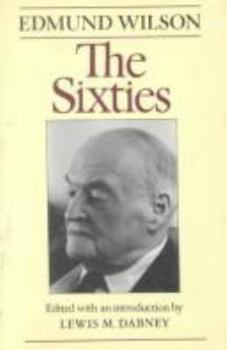The Sixtiestain PB
(Part of the The Notebooks and Diaries of Edmund Wilson Series)
Select Format
Select Condition 
Book Overview
The Sixties, the last of Edmund Wilson's posthumously published journals, is a personal history that is also brilliant social comedy and an anatomy of the times. Edited by Wilson's biographer, this... This description may be from another edition of this product.
Format:Paperback
Language:English
ISBN:0374524149
ISBN13:9780374524142
Release Date:January 1994
Publisher:Noonday Press
Length:968 Pages
Weight:1.20 lbs.
Dimensions:2.0" x 5.0" x 7.5"
Customer Reviews
2 ratings
Literary anthropologist
Published by Thriftbooks.com User , 17 years ago
The introduction notes that Wilson's journals are a collage. He was always the critic. In his gift for portraiture he is the equal of Dr. Johnson, Taine, and St.Beauve. Wilson died at age seventy-seven at his desk, in the manner of Karl Marx. In the beginning of the decade he is at Harvard. He realizes that he drinks too much to get himself out of a depression. His wife Elena enjoys talking with their friend, Dawn Powell. Wilson feels, after watching Malraux at a dinner at the Kennedy White House, that Malraux practiced deception as a matter of course. In Toronto, EW sees Morley Callaghan and his two sons. Callaghan had worked with Ernest Hemingway on the TORONTO STAR. Wilson travels to Quebec in the early sixties for the first time since a childhood stay in 1906. Dickens, Kipling, and Upstate New York were matters of importance in EW's childhood, and Quebec falls into the category, too. Wilson finds he likes Isaiah Berlin's international personality better than his Oxford aspect. EW reads some Balzac who specialized in brazen cynical careerists. Zola and Proust were influenced by Balzac. In Italy with Elena and his daughters Helen and Rosalind, Ew sees Lampedusa and Mario Praz. In Hungary he learns the inhabitants don't want anything having to do with Russia mentioned. The state controls housing. Everything is censored. Wilson believes that Hungarian, for reason of its stresses, is particularly appropriate for translating Greek and Roamn poets. Visiting Hungary, he is saddened because the 1848 Revolution was crushed and the same fate awaited the Revolt of 1956. In London Wilson sees Sonia Orwell, Natasha Spender, Wystan Auden, and V.S. Pritchett. Wilson likes Hemingway's MOVEABLE FEAST because it shows his younger brighter self. He cites Hemingway's capacity to bring out personalities. Wilson is appointed to the Center for Advanced Studies at Wesleyan. The Wilsons find Middletown to be down at the heels and Hartford, by way of contrast, a happening place. Wilson learns from Brendan Gill that the gold dome in Hartford memorializes the fact that Russia was the first customer of the Colt factory located there. When Dawn Powell visits Wilson at Talcottville, his family house in New York, she takes an interest in the events in the village. Dawm Powell dies in 1965. EW believes that dinner and drinks in Boston tend to be skimpy. He comments on this apropos a discussion of a dinner he attends at the American Academy of Arts and Science. Wilson is cheered by reading the diary of Anais Nin. He is a kind of Literary anthropologist in many respects including a task he sets for himself of indentifying novelists and others in the region of Talcottville. He remarks that art centers are coming into vogue as the mid sixties mark the beginning of government subsidies for the arts. When EW goes to the funeral of Waldo Frank in Cape Cod he thinks the undertaker is paying attention to some of the funeral-goers with a le
The winter of an intellectual lion
Published by Thriftbooks.com User , 24 years ago
Meticulous account by Wilson of his coming to terms with old age. His precise observations of his increasing enfeeblement, and of the "glitterati" with whom he socialized, make for fascinating reading. His restless movement from Manhattan to the countryside to the beach to Europe contrasts with the subtle melancholy of his narrative; it's a page-turner with a wintry mood. Disappointed by the surprising shabbiness of the Princeton Club, for example, Wilson says, "I doubt that I shall go there again," and it's as much an acknowledgment of his own mortality as a comment on the flaking plaster. The occasional summer breeze blows through, as when he indulges his passion for Hungarian culture in a suprisingly jaunty European excursion. Gossipy and detailed insider's glimpses abound: Wilson shows us the "Camelot" White House, visits Scottie Fitzgerald, and comments on the star-crossed relationship of Mike Nichols and Elaine May. (A bonus: The paperback is beautifully "packaged." Fine design, wonderful photographs, and the heft and feel of an expensive hardbound book.)




